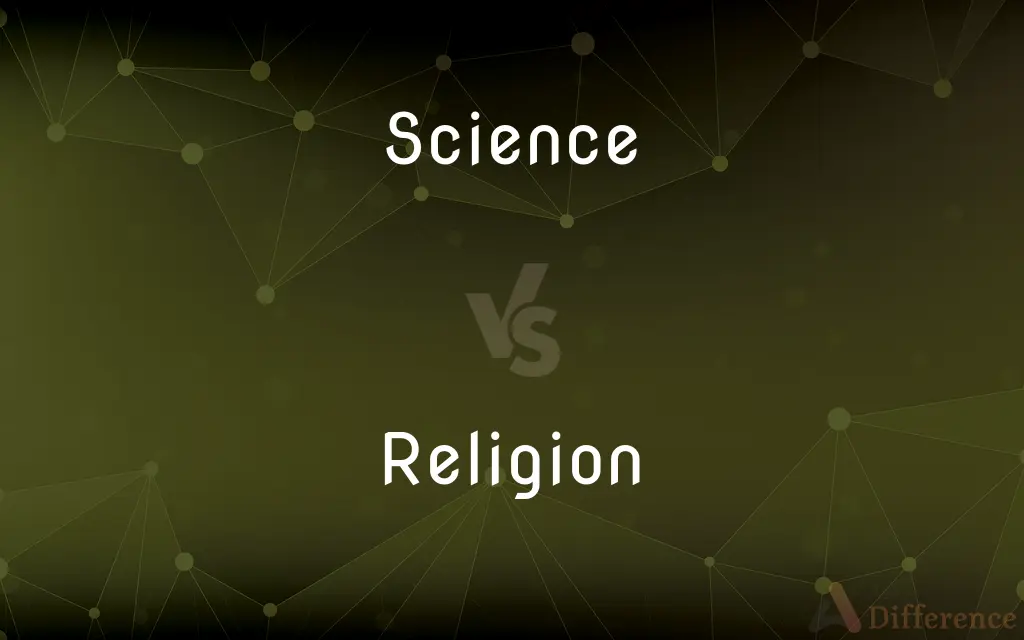Science vs. Religion — What's the Difference?

Difference Between Science and Religion
ADVERTISEMENT
Compare with Definitions
Science
Science (from Latin scientia 'knowledge') is a systematic enterprise that builds and organizes knowledge in the form of testable explanations and predictions about the universe.The earliest roots of science can be traced to Ancient Egypt and Mesopotamia in around 3000 to 1200 BCE. Their contributions to mathematics, astronomy, and medicine entered and shaped Greek natural philosophy of classical antiquity, whereby formal attempts were made to provide explanations of events in the physical world based on natural causes. After the fall of the Western Roman Empire, knowledge of Greek conceptions of the world deteriorated in Western Europe during the early centuries (400 to 1000 CE) of the Middle Ages, but was preserved in the Muslim world during the Islamic Golden Age.
Religion
Religion is a social-cultural system of designated behaviors and practices, morals, beliefs, worldviews, texts, sanctified places, prophecies, ethics, or organizations, that relates humanity to supernatural, transcendental, and spiritual elements; however, there is no scholarly consensus over what precisely constitutes a religion.Different religions may or may not contain various elements ranging from the divine, sacred things, faith, a supernatural being or supernatural beings or "some sort of ultimacy and transcendence that will provide norms and power for the rest of life". Religious practices may include rituals, sermons, commemoration or veneration (of deities and/or saints), sacrifices, festivals, feasts, trances, initiations, funerary services, matrimonial services, meditation, prayer, music, art, dance, public service, or other aspects of human culture.
Science
The observation, identification, description, experimental investigation, and theoretical explanation of phenomena
New advances in science and technology.
Religion
The belief in and reverence for a supernatural power or powers, regarded as creating and governing the universe
Respect for religion.
Science
Such activities restricted to a class of natural phenomena
The science of astronomy.
ADVERTISEMENT
Religion
A particular variety of such belief, especially when organized into a system of doctrine and practice
The world's many religions.
Science
A systematic method or body of knowledge in a given area
The science of marketing.
Religion
A set of beliefs, values, and practices based on the teachings of a spiritual leader.
Science
(Archaic) Knowledge, especially that gained through experience.
Religion
The life or condition of a person in a religious order
A widow who went into religion and became a nun.
Science
(countable) A particular discipline or branch of learning, especially one dealing with measurable or systematic principles rather than intuition or natural ability.
Of course in my opinion Social Studies is more of a science than an art.
Religion
A cause, principle, or activity pursued with zeal or conscientious devotion
A person for whom art became a religion.
Science
Specifically the natural sciences.
My favorite subjects at school are science, mathematics, and history.
Religion
(uncountable) Belief in a spiritual or metaphysical reality (often including at least one deity), accompanied by practices or rituals pertaining to the belief.
My brother tends to value religion, but my sister not as much.
Science
Knowledge gained through study or practice; mastery of a particular discipline or area.
Religion
(countable) A particular system of such belief, and the rituals and practices proper to it.
Belief system
Islam is a major religion, particularly in North Africa and Southwest Asia.
Mormonism is a new religion, while Zoroastrianism is an old one.
Science
The fact of knowing something; knowledge or understanding of a truth.
Religion
(uncountable) The way of life committed to by monks and nuns.
The monk entered religion when he was 20 years of age.
Science
(uncountable) The collective discipline of study or learning acquired through the scientific method; the sum of knowledge gained from such methods and discipline.
Religion
Rituals and actions associated with religious beliefs, but considered apart from them.
I think some Christians would love Jesus more if they weren't so stuck in religion.
Jack's spiritual, but he's not really into religion.
Science
(uncountable) Knowledge derived from scientific disciplines, scientific method, or any systematic effort.
Religion
(countable) Any practice to which someone or some group is seriously devoted.
At this point, Star Trek has really become a religion.
Science
The scientific community.
Religion
Faithfulness to a given principle; conscientiousness.
Science
Synonym of sweet science
Religion
Engage in religious practice.
Science
Obsolete spelling of scion
Religion
Indoctrinate into a specific religion.
Science
To cause to become versed in science; to make skilled; to instruct.
Religion
To make sacred or symbolic; sanctify.
Science
To use science to solve a problem.
Religion
The outward act or form by which men indicate their recognition of the existence of a god or of gods having power over their destiny, to whom obedience, service, and honor are due; the feeling or expression of human love, fear, or awe of some superhuman and overruling power, whether by profession of belief, by observance of rites and ceremonies, or by the conduct of life; a system of faith and worship; a manifestation of piety; as, ethical religions; monotheistic religions; natural religion; revealed religion; the religion of the Jews; the religion of idol worshipers.
An orderly life so far as others are able to observe us is now and then produced by prudential motives or by dint of habit; but without seriousness there can be no religious principle at the bottom, no course of conduct from religious motives; in a word, there can be no religion.
Religion [was] not, as too often now, used as equivalent for godliness; but . . . it expressed the outer form and embodiment which the inward spirit of a true or a false devotion assumed.
Religions, by which are meant the modes of divine worship proper to different tribes, nations, or communities, and based on the belief held in common by the members of them severally. . . . There is no living religion without something like a doctrine. On the other hand, a doctrine, however elaborate, does not constitute a religion.
Religion . . . means the conscious relation between man and God, and the expression of that relation in human conduct.
After the most straitest sect of our religion I lived a Pharisee.
The image of a brute, adornedWith gay religions full of pomp and gold.
Science
Knowledge; knowledge of principles and causes; ascertained truth of facts.
If we conceive God's sight or science, before the creation, to be extended to all and every part of the world, seeing everything as it is, . . . his science or sight from all eternity lays no necessity on anything to come to pass.
Shakespeare's deep and accurate science in mental philosophy.
Religion
Specifically, conformity in faith and life to the precepts inculcated in the Bible, respecting the conduct of life and duty toward God and man; the Christian faith and practice.
Let us with caution indulge the supposition that morality can be maintained without religion.
Religion will attend you . . . as a pleasant and useful companion in every proper place, and every temperate occupation of life.
Science
Accumulated and established knowledge, which has been systematized and formulated with reference to the discovery of general truths or the operation of general laws; knowledge classified and made available in work, life, or the search for truth; comprehensive, profound, or philosophical knowledge.
All this new science that men lere [teach].
Science is . . . a complement of cognitions, having, in point of form, the character of logical perfection, and in point of matter, the character of real truth.
Religion
A monastic or religious order subject to a regulated mode of life; the religious state; as, to enter religion.
A good man was there of religion.
Science
Especially, such knowledge when it relates to the physical world and its phenomena, the nature, constitution, and forces of matter, the qualities and functions of living tissues, etc.; - called also natural science, and physical science.
Voltaire hardly left a single corner of the field entirely unexplored in science, poetry, history, philosophy.
Religion
Strictness of fidelity in conforming to any practice, as if it were an enjoined rule of conduct.
Those parts of pleading which in ancient times might perhaps be material, but at this time are become only mere styles and forms, are still continued with much religion.
Science
Any branch or department of systematized knowledge considered as a distinct field of investigation or object of study; as, the science of astronomy, of chemistry, or of mind.
Good sense, which only is the gift of Heaven,And though no science, fairly worth the seven.
Religion
A strong belief in a supernatural power or powers that control human destiny;
He lost his faith but not his morality
Science
Art, skill, or expertness, regarded as the result of knowledge of laws and principles.
His science, coolness, and great strength.
Religion
Institution to express belief in a divine power;
He was raised in the Baptist religion
A member of his own faith contradicted him
Science
To cause to become versed in science; to make skilled; to instruct.
Science
A particular branch of scientific knowledge;
The science of genetics
Science
Ability to produce solutions in some problem domain;
The skill of a well-trained boxer
The sweet science of pugilism
Share Your Discovery

Previous Comparison
Performative vs. Constative
Next Comparison
Sequence vs. Scene













































